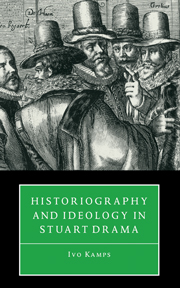Book contents
- Frontmatter
- Contents
- Preface
- Introduction
- 1 Renaissance historiography
- 2 Historiography and Tudor historical drama: the example of Bale's King Johan
- 3 Thomas Heywood and the Princess Elizabeth: disrupting diachronic history
- 4 Shakespeare, Fletcher, and the question of history
- 5 “No meete matters to be wrytten or treated vpon”: The Tragedy of Sir John Van Olden Barnavelt
- 6 Perkin Warbeck and the failure of historiography
- Conclusion
- Notes
- Bibliography
- Index
4 - Shakespeare, Fletcher, and the question of history
Published online by Cambridge University Press: 18 December 2009
- Frontmatter
- Contents
- Preface
- Introduction
- 1 Renaissance historiography
- 2 Historiography and Tudor historical drama: the example of Bale's King Johan
- 3 Thomas Heywood and the Princess Elizabeth: disrupting diachronic history
- 4 Shakespeare, Fletcher, and the question of history
- 5 “No meete matters to be wrytten or treated vpon”: The Tragedy of Sir John Van Olden Barnavelt
- 6 Perkin Warbeck and the failure of historiography
- Conclusion
- Notes
- Bibliography
- Index
Summary
The Kings Players had a new Play called All is True, representing some principle pieces of the Reign of Henry 8. which was set forth with many extraordinary circumstances of Pomp and Majesty, even to the matting of the stage; the Knights of the Order, with their Georges and Garter, the Guards with their embroidered Coats, and the like: sufficient in truth within a while to make greatness very familiar, if not ridiculous.
Henry WottonShakespeare's Henry VIII (1612–13), a play presumably written in collaboration with John Fletcher, has often been chastised for being episodic and lacking a strong hero. In many cases, the basis for this judgment is a comparison of this Jacobean text with Shakespeare's supposedly more successful Elizabethan history plays: “the weakness of Henry VIII results from its failure to embody an over-all consistent philosophical scheme such as makes cohesive unities out of all of Shakespeare's earlier histories, including King John.” This type of comparison is ill-conceived because it rests on the unfounded assumption that Shakespeare and Fletcher were trying (or ought to have tried) to compose an Elizabethan history play. It ignores the fact that when a genre alters under the pressures of the changing times, our readings must be attentive to the new historical conditions that went into its making. I will argue therefore that far from giving “us a coherent and meaningful philosophy of history” (Ribner, English History Play 191), Henry VIII tackles two problems central in the development of Jacobean historiography: it undercuts and revises the Tudor conception of history as the history of great men, and it shatters the Tudor propensity for unified (often providential) historiography.
- Type
- Chapter
- Information
- Historiography and Ideology in Stuart Drama , pp. 91 - 139Publisher: Cambridge University PressPrint publication year: 1997



